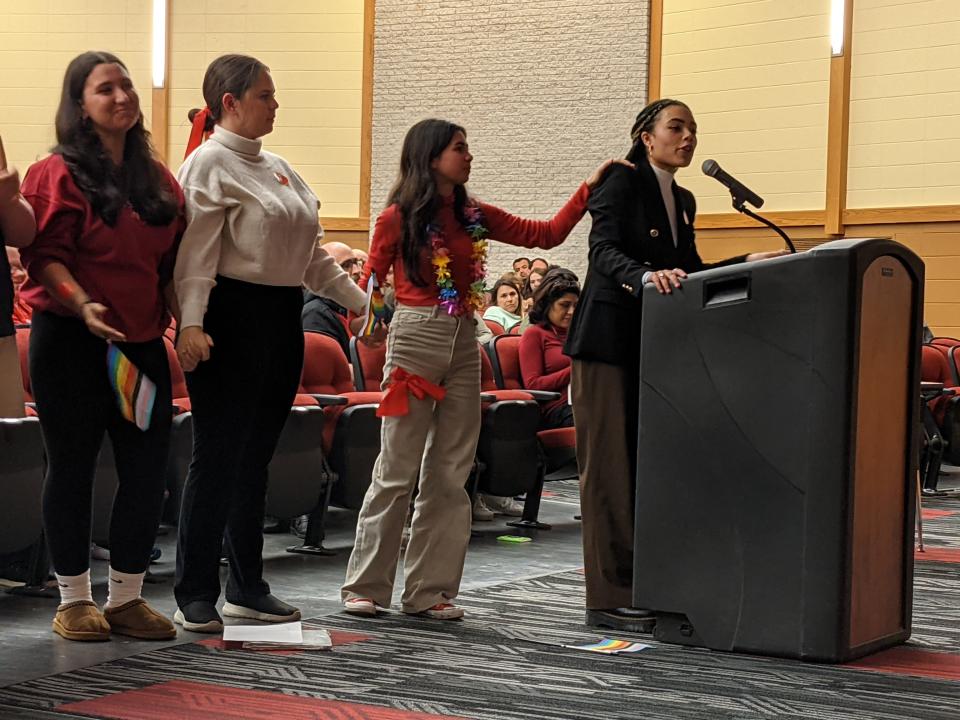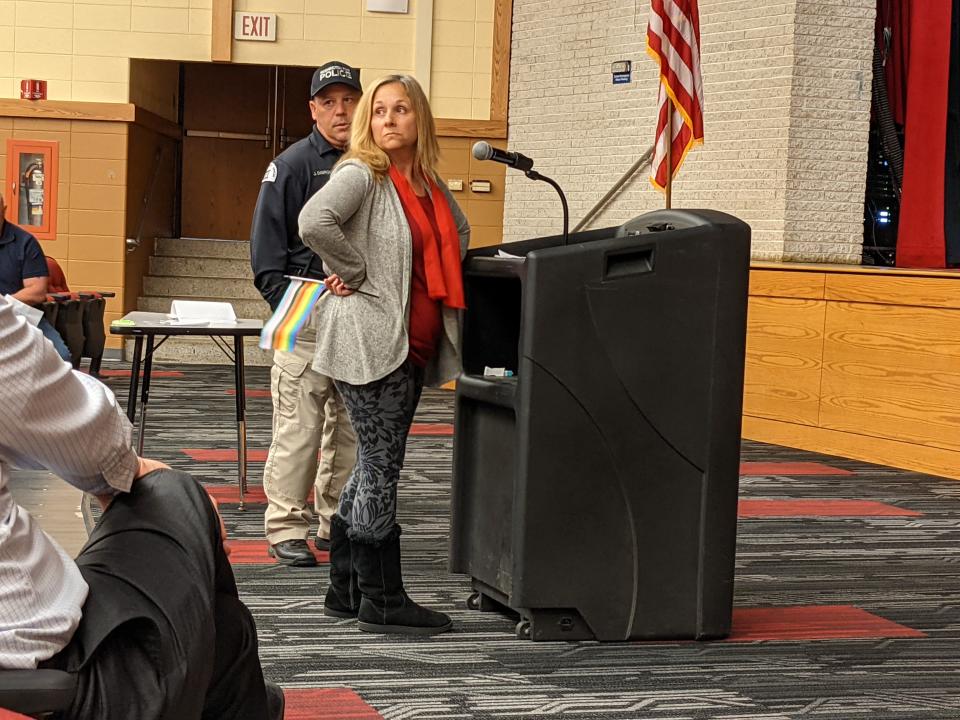Westwood school board introduces parental rights policy: What it means
- Oops!Something went wrong.Please try again later.
The Westwood Regional School District has introduced a parental rights policy to keep parents informed of matters related to their children, but critics believe it could bring a lawsuit from the state attorney general, who has been suing other districts over similar policies.
The policy passed on first reading in a 6-1 vote on Thursday night, with an abstention from Jay Garcia and with Andrea Peck being the dissenting vote. Board President Michael Pontillo was absent from the meeting. It will have a second reading at a future school board meeting.
The policy, which was put together by the board’s policy committee with guidance from the board’s attorney, was created under the belief that “parental rights are coming under risk,” said Laura Cooper, who sits on the committee. She said “parental rights” are here to “protect children and the sanctity of the family” and not have to “co-parent with the state.”
“The purpose of this policy is to declare the statement that in this district, parents have an extra level of rights,” Cooper said. “Yes, there are notifications ... We crafted it in such a way to not draw down the pretty tyrannical, in my opinion, ire of the attorney general.”

The state Attorney General’s Office and Hanover Township's school board remain locked in a monthlong legal impasse over a controversial district policy that the Murphy administration says risks outing LGBTQ+ kids without their consent. Middletown, Manalapan and Marlboro were also being sued for policies that would require parental notification when students seek to change their gender preferences, pronoun choices or names.
Cooper said the committee has done “everything possible to mitigate risk to our district from actions by the attorney general. According to the policy, the parental notification to Westwood and Washington Township parents cannot be based on protected characteristics including race, ancestry, sex, gender identity or expression, affectional or sexual orientation and disabilities.
“I want to make it clear that the board is deeply aware that the teachers and administration are stuck in the middle of very challenging issues,” Cooper said.
The proposed language
The policy states that it wants to “provide direction and guidance to school district administrators and staff” for their obligations to keep students’ parents “reasonably informed with respect to all material matters pertaining to their children.”
Parental notification would occur when there is observation of an “adverse effect” on a student’s well-being, including substance use, tobacco/vaping use, alcohol use, firearms, peer/academic/athletic pressures, school performance, eating disorders, suicide, self-harm and anxiety.
However, this notification to parents cannot, in whole or in part, be based on characteristics defined by New Jersey’s Law Against Discrimination.
If a staff member believes notifying a parent would put the student at risk of abuse or neglect, the staff member would notify the Department of Children and Families, Institutional Abuse, Division of Child Protection and Permanency, and/or the Westwood or Washington Township Police Department, respectively.
Critics question purpose

Garcia, who abstained from voting because he said he did not have enough information, asked to table the policy to provide additional time to discuss “its intent and potential ramifications," naming the other school districts that have been sued.
“I have a policy addendum placed in front of me on the day of a board meeting, and I think it’s only fair to the parents and stakeholders just to take the time to review the policy further,” Garcia said.
Cooper said she “disagreed strongly and vehemently” with Garcia, since she believed time was of the essence. Cooper said she believed the district could also be at risk for lawsuits if “overzealous lawyers” file personal civil lawsuits against anyone in the district who was knowingly or unknowingly withholding information from a parent.
“When looking at it through that lens, I’d rather take the risk and get sued for something that was protecting children and the sanctity of the family than get sued because we didn’t notify parents about a material concern that led to an issue or injury,” Cooper said.
Peck, who voted against the policy, said all the things listed already have “very clear” existing policies and she has full faith that teachers would go to the appropriate people in the building. She objected to putting the district in the “line of fire and litigation” when there are existing policies in place that protect students.
“We are putting more on our teachers that is not within their purview or their responsibilities,” Peck said.
Board Vice President Kristen Pedersen responded to Peck’s concerns, saying the policy does not specify that teachers need to call parents themselves and that she felt that the policy added a "layer of assurance to parents that they will be informed." Peck then again questioned why the policy was being discussed at all, as “we already have policies in place.”
Some residents echoed the concerns about the purpose of the policy during public comment. Resident Kelly O’Connor said she believed that the board members wanted to “push this through before people are able to tell you they don’t agree with it.”
“If the community doesn’t want this, why would you risk anything?” asked O’Connor. “At least reach out and let them give their input. That’s what you’re supposed to be doing.”
Joe McAllister, a former school board member from Washington Township, said he was curious about why the policy was needed, listing policies that address the topics that are in the newer policy. He thought it was an admirable goal to notify parents regarding circumstances related to students' physical or mental health, but questioned the timing and asked, “What is not being shared with parents that members of this board think ought to be?”
Heated school board meetings have been a regular fixture in the district, where teachers and LGBTQ+ students have complained that a new board majority is trying to police discussion about sex, gender identity and other hot-button topics. Across the state, conservative school board members who campaigned on the parental rights platform and pushed against state mandates have led to tempestuous meetings this year.
Over the past few months, critics in the Westwood and Washington Township communities turned out to protest after two board members called classroom discussions of same-sex couples a "sensitive topic" and when the board adopted a flag policy allowing only the American and state flags to fly on school grounds. That new policy led to the removal of an LGBTQ pride sign outside the district middle school, though such banners are still allowed inside schools. Community members also raised concerns about language changes in a "controversial topics" policy.
This article originally appeared on NorthJersey.com: Westwood NJ school board introduces parental rights policy

